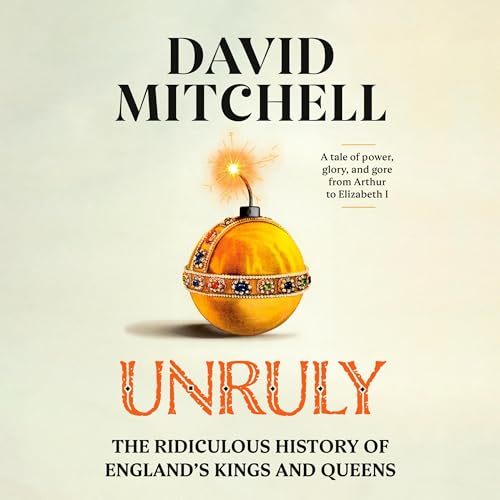David Mitchell – Unruly Audiobook
David Mitchell – Unruly (The Ridiculous History of England’s Kings and Queens) Audiobook

“Unruly: The Life of Thomas Hoccleve” represents a unique confluence of historical biography and narrative artistry, penned by the acclaimed novelist David Mitchell. Known for his versatility and innovative approach to storytelling in works such as “Cloud Atlas” and “The Bone Clocks,” Mitchell takes a step back in time to breathe life into the obscure yet fascinating figure of Thomas Hoccleve, a medieval poet whose personal and professional struggles provide a poignant reflection of 15th-century England.
In “Unruly,” Mitchell meticulously constructs a vivid portrait of Thomas Hoccleve, a poet and clerk serving the Privy Seal under King Henry IV and later King Henry V. Hoccleve’s literary contributions, often overshadowed by the towering figure of Geoffrey Chaucer, emerge as rich tapestries of medieval life filled with personal and societal observations. The biography delves deeply into Hoccleve’s known works, notably “La Male Regle” and “The Regiment of Princes,” drawing connections between the poet’s internal world and the external realities of his time.
Mitchell’s narrative begins by situating Hoccleve within the broader historical and cultural milieu of 15th-century England. This was a period marked by political turmoil, social change, and the ongoing aftermath of the Hundred Years’ War. The Peasants’ Revolt and the power struggles within the English monarchy also form the backdrop to Hoccleve’s life, and Mitchell masterfully interweaves these historical events with the poet’s personal experiences. Through this integration, readers gain an appreciation for how external forces shaped individual lives and creative outputs.
A significant portion of the biography focuses on Hoccleve’s early life and career. Born around 1368, Hoccleve’s modest beginnings and subsequent rise to a clerkship with the Privy Seal—an important position which involved drafting official documents and letters for the crown—are detailed with precision. Mitchell chronicles Hoccleve’s ambitions, his interactions with influential figures of the time, and his aspirations towards literary recognition. These sections of the biography not only provide an intimate look at Hoccleve’s professional life but also illuminate the complex bureaucracy of medieval England.
Mitchell’s exploration of Hoccleve’s poetry unveils a man deeply reflective and often troubled by his mental health. Hoccleve’s “Complaint” and “Dialogue with a Friend,” where he narrates his own experiences with what modern readers might identify as anxiety and depression, offer touching insights into his psyche. Mitchell treats these subject matters with sensitivity, highlighting Hoccleve’s courage in articulating his suffering at a time when mental illness was often misunderstood or stigmatized. The biography discusses how Hoccleve’s candid accounts provide one of the earliest autobiographical insights into mental health, marking him as a pioneering figure in this regard.
The narrative structure of “Unruly” is enriched by Mitchell’s literary craftsmanship. He employs a range of narrative techniques, including fictionalized dialogues and recreated scenes that bring historical figures and everyday life vividly to the fore. Mitchell’s skillful storytelling blurs the lines between biography and historical fiction, engaging readers in Hoccleve’s world with a immediacy and intimacy. This approach allows Mitchell to fill in the gaps of historical record with informed speculation, creating a narrative that is both educational and compelling.
The audiobook version of “Unruly” elevates this experience by leveraging the power of voice acting to bring characters and historical settings to life. Each figure in Hoccleve’s story is given a distinctive voice, and the narrator’s nuanced performance encapsulates the emotional and historical depth of Mitchell’s prose. The auditory experience enhances the vivid descriptions of medieval London, the clamor of its streets, the solemnity of the royal court, and the quiet introspection of Hoccleve’s private moments.
In the latter parts of the biography, Mitchell delves into Hoccleve’s legacy and the lasting impact of his works. While not achieving the renown of Chaucer, Hoccleve’s writings have been influential in providing historians with first-hand accounts of medieval England’s culture and societal norms. Mitchell reflects on Hoccleve’s contributions to English literature, particularly his ability to document the personal and the political with equal eloquence.
Furthermore, Mitchell explores the broader implications of Hoccleve’s work on our understanding of mental health. Hoccleve’s frank discussions about his mental afflictions challenge contemporary perceptions of medieval attitudes toward psychological disorders. By bringing Hoccleve’s internal battles into the light, Mitchell provides a nuanced view of how mental illness was experienced and conveyed in an era largely devoid of modern medical understanding.
“Unruly” is not just a biography of a medieval poet; it is a scholarly yet accessible examination of the interplay between individual lives and historical forces. David Mitchell’s narrative renders Thomas Hoccleve’s story with depth, empathy, and a keen eye for historical detail, making it a rich resource for both literature enthusiasts and history buffs.
In conclusion, “Unruly” offers readers an enthralling and multifaceted portrayal of Thomas Hoccleve, a figure whose works resonate with timeless themes of struggle, resilience, and the quest for understanding one’s place in the world. The audiobook format, with its engaging narration and dynamic character voices, serves to draw listeners deeply into the medieval setting, providing an immersive experience that is both enlightening and emotionally stirring. Whether delving into the pages of the book or listening to the audiobook, “Unruly” stands as a testament to David Mitchell’s skill in bringing history to life through the art of storytelling.